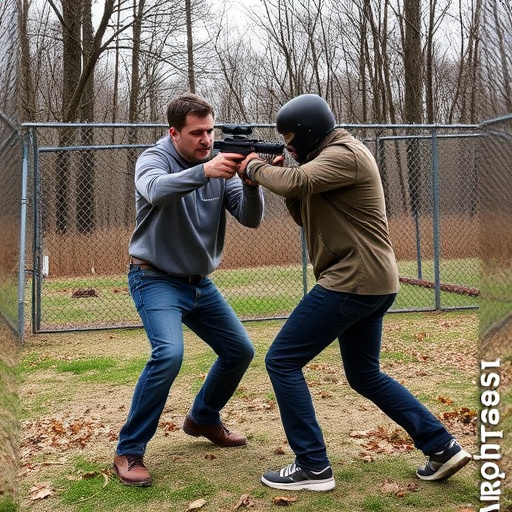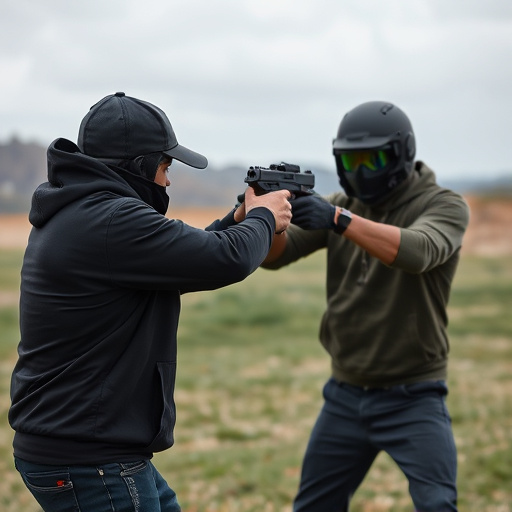The regulation of civilian Taser ownership in the US varies greatly by state, with laws dictating who can own them, what types are allowed, required training, and permissible use cases. Understanding these state-specific guidelines is crucial for legal compliance and responsible usage of non-lethal self-defense stun weapons. Key requirements often include age (21+), background check, safety training, and permit acquisition through local or state authorities. Proper training and adherence to safety protocols are essential due to Tasers' not foolproof nature and strict state regulations on use of force in self-defense situations.
“In today’s world, civilians are increasingly exploring options for personal safety, turning to non-lethal self-defense stun weapons as a viable alternative to traditional firearms. This comprehensive guide delves into the legal landscape surrounding civilian taser ownership, focusing on state laws and regulations. We’ll explore the definition and benefits of non-lethal self-defense tools, compare federal vs state rules, and navigate the specific requirements for obtaining a Taser permit. Understanding these guidelines is essential for those seeking to exercise their right to self-protection while adhering to local legislation.”
- Understanding Non-Lethal Self-Defense Stun Weapons
- Legal Framework: Federal vs State Regulations
- Requirements for Civilian Taser Ownership
- State-Specific Laws and Guidelines
- Process of Obtaining a Taser Permit
- Common Misconceptions and Safety Precautions
Understanding Non-Lethal Self-Defense Stun Weapons

Non-lethal self-defense stun weapons, often referred to as Tasers, are designed to incapacitate individuals through electrical impulsesthat temporarily disrupt muscle control, making it difficult for them to move or resist. Unlike traditional firearms, these devices are not intended to cause serious harm or permanent injury. Instead, they serve as a means of self-defense and crowd control by enabling users to disable attackers without resorting to lethal force.
State laws governing civilian Taser ownership vary widely. Some states allow individuals to carry Tasers for personal protection without a permit, while others require users to obtain special licensing or certifications. Understanding the legal framework surrounding non-lethal self-defense stun weapons is crucial before considering their acquisition and use. Knowing the specific requirements in your state ensures compliance with the law and promotes responsible ownership.
Legal Framework: Federal vs State Regulations

The legal framework surrounding civilian ownership of non-lethal self-defense stun weapons, commonly known as tasers, is a complex interplay between federal and state regulations. While the United States Federal Government has established guidelines for law enforcement agencies’ use of tasers, individual states hold the authority to dictate civil possession. This creates a patchwork of laws across the nation, with some states allowing open carry while others require permits or restrict ownership altogether.
Federal laws, such as those set by the Bureau of Alcohol, Tobacco, Firearms and Explosives (ATF), primarily focus on regulating the sale and use of tasers for non-law enforcement purposes. They ensure that these devices are safe and designed for personal protection without posing a significant risk to public safety. State regulations, however, often go beyond federal requirements, adding specific conditions like background checks, waiting periods, or even outright bans on civilian ownership of stun guns. Understanding both levels of regulation is crucial for individuals interested in acquiring non-lethal self-defense tools, as compliance with local laws is essential to avoid legal repercussions.
Requirements for Civilian Taser Ownership

In many states across the US, civilians can legally own and carry non-lethal self-defense stun weapons, including tasers. However, accessing this right comes with certain requirements that vary from state to state. These regulations are designed to ensure responsible ownership and use of these powerful tools. Typically, prospective owners must be at least 21 years old, pass a background check, and complete a training course focused on safe and legal use. Some states also mandate proof of completion for a self-defense or safety class.
Beyond these common stipulations, state laws differ in their specific details. For instance, certain areas may restrict the type of taser permitted, such as allowing only models with lower voltage outputs. Others might have restrictions on where and when stun weapons can be carried, like prohibiting them in schools, courthouses, or while under the influence of alcohol or drugs. Understanding these nuances is crucial for responsible civilian taser ownership.
State-Specific Laws and Guidelines

Each state in the US has its own set of laws and guidelines regarding civilian ownership of non-lethal self-defense stun weapons, commonly known as tasers. These regulations can vary widely, from strict controls to relatively lenient policies. It’s crucial for individuals considering purchasing a taser to understand the specific legal framework in their state.
State-specific laws often dictate who can own and carry a taser, the types of tasers allowed, and any required training or licensing. Some states only permit law enforcement agencies and security professionals to use tasers, while others enable civilian ownership with certain restrictions. The laws may also cover issues like open carry versus concealed carry, restrictions on powerful vs. low-voltage tasers, and scenarios under which taser use is permissible. Staying informed about these guidelines ensures responsible ownership and adherence to the law.
Process of Obtaining a Taser Permit

Obtaining a permit to own a taser, classified as a non-lethal self-defense stun weapon, varies across states. The process typically involves several key steps. First, individuals interested in owning a taser must meet specific eligibility criteria, which often include being at least 21 years old and of good moral character. They will also need to complete a training course that covers safe handling, use, and legal aspects of the device. These courses are usually conducted by certified instructors or law enforcement agencies.
After meeting these initial requirements, applicants must submit an application to their local law enforcement agency or relevant state authority. This includes providing personal information, proof of identity, and possibly a background check. Once approved, they will receive a permit allowing them to purchase and carry a taser for self-defense purposes. It’s important to note that permit rules and restrictions can differ significantly from state to state, so prospective owners should always consult their local laws.
Common Misconceptions and Safety Precautions

Common Misconceptions and Safety Precautions
One of the prevalent misconceptions surrounding civilian taser ownership is that it offers a foolproof method for self-defense, which isn’t entirely true. While non-lethal self-defense stun weapons like tasers can incapacitate an assailant temporarily, they are not without limitations or risks. Users must be aware that proper training and adherence to safety protocols are essential. Many states have strict regulations on the use of force, including tasers, emphasizing the need for proportionality and reasonable force in self-defense situations.
Additionally, safety precautions should include understanding the device’s range, charging instructions, and de-escalation techniques. Owning a taser is not just about purchasing the device but also learning how to use it responsibly and effectively. Users must be educated on the legal implications of taser deployment to ensure they act within their rights and don’t violate local laws or cause unnecessary harm.
The legalization and regulation of civilian taser ownership vary greatly across states, reflecting a complex interplay between public safety concerns and individual rights. Understanding state laws regarding non-lethal self-defense stun weapons is crucial for responsible citizenship. By familiarizing themselves with the requirements, permit processes, and safety precautions outlined in this article, prospective owners can make informed decisions while navigating the legal framework governing these devices. Empowered with knowledge, individuals can contribute to a safer society while ensuring their rights are protected.
